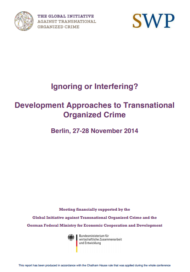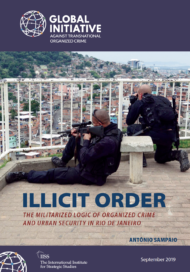Interpol has just concluded its annual Global Conference in Monaco in November 2014, a highlight event as it marks 100 years since the closed door meeting that originally founded the organisation.
In April 1914, amidst grand fanfare and ceremony, law enforcement professionals from Europe and elsewhere met in Monaco to talk about the state of their profession and what to do about it.
At the time of the Monaco conference, law enforcement was a domestic profession. If policemen found that their investigation, for whatever reason, required them to cross an international border, the only way to continue was to turn a police matter into a diplomatic affair. But at the dawn of the automotive and aviation age, diplomacy was clearly no longer a viable method of catching criminals. In the words of Monsieur Mouton, then-director of the French criminal police and delegate to the conference, “we will have to be able to go to England, to Spain, to everywhere….It will be necessary for us to be able to apprehend, or arrange for the apprehension of, an individual through our own means, without being troubled by the slowness of diplomatic formalities.”
While the Organisation international de la police criminelle, better known as Interpol, was not actually founded until 1923, in the intervening decades, true to the spirit of its founders, Interpol has revolutionised global policing and has become a critical part of global law enforcement. Its Command and Coordination Centres (CCCs) are staffed around the clock, ready to provide member countries with information and assistance whenever necessary. Interpol Red Notices, which are issued when an Interpol member country seeks a suspect’s apprehension and extradition, have led to the capture of notorious criminals including Carlos the Jackal. There are currently 190 members of Interpol, or only three fewer than there are in the United Nations, making it a truly global law enforcement network.
Interestingly, the challenges described that promoted the Monaco conference are not dis-similar to those that inspired the creation of the Global Initiative against Transnational Organized Crime.
The senior law enforcement professionals that made up the Global Initiative’s founding members identified the challenge presented by transnational organised crime to be unprecedented – requiring new tools, new approaches and greater levels of collaboration and trust than national law enforcement frameworks provide. The role of the Global Initiative, for them, was to provide space outside of multi-lateral organisations to exchange experiences, build networks and identify urgent priorities for collaboration.
Strengthening international ties and building trust between all concerned parties, goals shared by Interpol and the Global Initiative, are crucial to dealing with modern-day policing challenges. The Global Initiative is proud to consider Interpol one of our key partners, and are pleased to congratulate Jürgen Stock, one of our Founding Members, on his appointment as Interpol’s next Secretary General.
Interpol: nuevas respuestas a los desafíos en materia de seguridad internacional
Interpol acaba de concluir su Conferencia Mundial anual en Mónaco en noviembre de 2014, evento que marca los 100 años de la reunión a puertas cerradas que dio origen a la organización.
En abril de 1914, entre bombas y platillos, profesionales de la seguridad pública de todo el mundo se reunieron en Mónaco para hablar sobre la situación de su profesión y sobre los pasos a seguir.
Al momento de la conferencia en Mónaco, la seguridad pública era una profesión de alcance local. Si un agente de policía descubría que su investigación, por cualquier motivo, requería que se cruzara una frontera internacional, la única forma de proseguir era transformar un asunto policial en un tema diplomático. Pero con el amanecer de la era automotriz y de la aviación, la diplomacia claramente dejó de ser un método viable para atrapar criminales. En palabras de Monsieur Mouton, entonces director de la policía criminal y delegado de la conferencia: “tendremos que ser capaces de ir a Inglaterra, a España, a todos lados… Será preciso que podamos capturar u organizar la captura de un sujeto por nuestros propios medios, sin que se presenten inconvenientes por la lentitud de las formalidades diplomáticas”.
La Organisation international de la police criminelle, más conocida como Interpol, no se fundó hasta 1923 y, siguiendo el espíritu de sus fundadores, Interpol ha revolucionado la vigilancia global y se ha convertido en una parte crucial de la seguridad pública mundial. Sus Centros de Comando y Coordinación (CCC) cuentan con una guardia las 24 horas, lista para brindarles información y asistencia a sus países miembros en el momento en el que lo necesiten. Las “notas rojas” de Interpol, que se emiten cuando un estado miembro busca la captura o la extradición de un sospechoso, han posibilitado la captura de grandes criminales, como Carlos “El Chacal”. En la actualidad, Interpol cuenta con 190 países miembros, sólo tres menos de los que tienen las Naciones Unidas, lo que lo hace una red de seguridad verdaderamente global.
Curiosamente, los desafíos mencionados que promovieron la conferencia de Mónaco son similares a aquellos que inspiraron la creación de Global Initiative against Transnational Organized Crime.
Los grandes profesionales de seguridad pública que fundaron Global Initiative creen que los desafíos impuestos por la delincuencia transnacional organizada no tienen precedentes, y que requieren de nuevas herramientas, nuevas estrategias y mayores niveles de colaboración y confianza que los proporcionados por los marcos legales nacionales. Para ellos, el rol de Global Initiative es ofrecer un lugar fuera de las organizaciones multilaterales con el fin de intercambiar experiencias, construir redes e identificar las prioridades más inmediatas que requieran de colaboración.
El fortalecimiento de los lazos internacionales y el desarrollo de confianza entre todas las partes interesadas –metas compartidas entre Interpol y Global Initiative – son cruciales para el abordaje de los desafíos policiales en la era moderna. Global Initiative está orgullosa de considerar a Interpol como uno de sus socios principales, y felicita a Jürgen Stock, uno de sus Miembros Fundadores, por su nombramiento como próximo Secretario General de Interpol.



